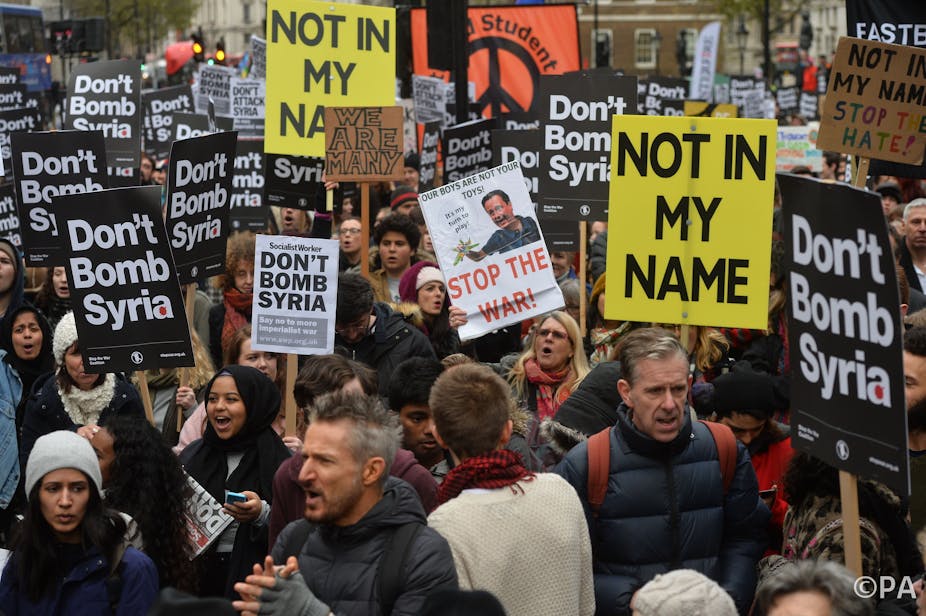Jeremy Corbyn has decided to allow Labour MPs a free vote on whether the UK should bomb Islamic State in Syria. This follows days of speculation over whether Corbyn might seek to impose a whip on them to oppose David Cameron on the issue.
The decision has disappointed some on the left who were looking for a strong Labour effort to defeat the government on airstrikes. In the end, Corbyn appears to have calculated that this is the least damaging way to handle an issue that is dividing his party. Yet Corbyn’s own ongoing opposition to military action has important implications for national political debate on how to oppose IS.
British military interventions in the Middle East have often been supported by the frontbenches of both political parties, lending an air of legitimacy and political unity to actions that will put British soldiers’ lives at risk.
However, it has also meant that opposition parties can become restricted in their ability to challenge governments over ongoing military action. Iain Duncan Smith backed Tony Blair over the Iraq war for example, when he was Tory leader between 2001 and 2003. However, Blair’s decision to involve the UK in Iraq is generally now seen as a huge mistake. Ed Miliband repeatedly said so when he was opposition leader between 2010 and 2015.
The legacy of Iraq has loomed large in debates on Syria and, in 2013, Miliband was instrumental in ensuring the coalition government was defeated in a vote on UK military involvement against the Syrian government.
Labour on the edge
When electing Corbyn as leader, Labour knew it was endorsing a politician with a long track record of opposing Western involvement in the Middle East. And Corbyn is maintaining that position even as he allows his party members to vote with their conscience.
In the short term, the decision to allow a free vote makes it easier for David Cameron to achieve a parliamentary majority in favour of airstrikes, even if some Conservative MPs rebel.

In the longer term, Corbyn faces multiple political difficulties within his own party. Sections of parliamentary Labour are supportive of airstrikes. They have argued Labour should align itself with public attitudes in the wake of the Paris attacks. But an internal survey has reportedly found 75% of Labour party members opposed intervention of this kind.
Corbyn’s internal opponents fear that the party may gain a reputation for “appeasement” in the face of terror threats. Some have even called for Corbyn to step down as leader over his handling of the issue.
Allowing shadow cabinet members to vote with the government will not undo the damage done in the run up to the vote. Some of Corbyn’s top team are likely to be vocal about their position against him now that they have been given licence to do so. They hope that current divisions will hasten his demise following several weeks of negative media coverage for the party, most recently shadow chancellor John McDonnell’s astonishing decision to quote from Chairman Mao’s Little Red Book.
Yet Corbyn supporters are squaring up on the other side of the debate. UNITE leader Len McCluskey has argued that “Westminster bubble dwellers” seeking to depose the leader could be “writing their own political obituaries”. Within the party membership, the new pressure group Momentum is determined that the parliamentary party should not be allowed to stage an early coup against a leader who recently obtained such a large mandate from the party membership.
What appears to be emerging is a high-stakes power struggle between different sections of the party, with no obvious way of resolving tensions. A risk for Labour now is that internal infighting dominates media coverage of the party, with journalists continually being fed provocative quotes from rival camps.
The hysterical language being used (not least by those who like to think of themselves as moderates) opens Labour up to the charge of being self-obsessed at a point where the public expect politicians to be confronting profoundly complex security questions.

